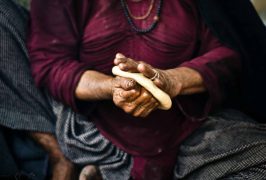LEAF mourns the death of Regis Korchinski-Paquet, an Afro-Indigenous woman who died after the police were called to assist when she was in distress. Like so many around the world, we are also mourning the recent deaths of George Floyd, Tony McDade, Sean Reed, Breonna Taylor, and Ahmaud Arbery in the United States. Such senseless and tragic deaths are not unique to the United States, however.
While we do not yet know all the circumstances surrounding Korchinski-Paquet’s death, it occurred in the context of historical and ongoing police violence against the Black community in Canada. A 2018 Ontario Human Rights Commission report found that, in Toronto, a Black person is 11 times more likely than a white person to be involved in a police use of force case that led to a civilian death. Black people are also disproportionately represented in Ontario’s Special Investigations Unit (SIU)’s use of force cases where mental health issues have been identified.
Regis Korchinski-Paquet’s death is an intersectional feminist issue.
Regis Korchinski-Paquet’s death is an intersectional feminist issue. All women have the right to equal protection and equal benefit of the law, and police must respect equality rights in the exercise of their duties. Yet, as Robyn Maynard has highlighted, police disproportionately surveil Black women across Canada. Police violence against Black women is a longstanding problem – one that deserves more discussion and solidarity from the feminist community.
The police response to mental distress calls in Black communities may be another disturbing part of Korchinski-Paquet’s death. This element is being highlighted by her family. The chronic underfunding of mental health resources, particularly in Black and Indigenous communities, leaves society relying on police to handle mental distress calls. Too often, this has fatal consequences for Black and Indigenous communities, due in no small part to the law’s colonial and racist legacy.
Canadian law is not a neutral instrument. As a product of colonialism, it has reproduced the legacy of racism, sexism, ableism, and other oppressive structures. Although much work has been done to reform the law’s oppressive roots, it is far from complete. The application of our laws continues to perpetuate colonial, racist, and sexist bias, leading to the marginalization and fatality of Black and Indigenous women.
More generally, we know that racism has significant and devastating consequences for mental health, including trauma and mental distress. As Dr. Kwame McKenzie observes, members of the Black community are not only more likely to face challenges linked to worse mental health outcomes for all individuals, such as unemployment, poverty, and criminalization – they also face unique challenges stemming from pervasive racism. Further, as discussed by Notisha Massaquoi at a recent panel discussion on racism and mental health, the stereotype of the “strong Black woman” means that it is often expected that Black women will carry all of their burdens, and fight back against them, too. This stereotype invisibilizes the mental health struggles that Black women face and detrimentally impacts the healthcare and pain management options they receive.
As an organization dedicated to the equality rights of women, girls, and all who face gender-based discrimination, LEAF calls for the following:
- In solidarity with Not Another Black Life, we call for a fair, independent and open investigation that answers questions about the circumstances surrounding Regis Korchinski-Paquet’s death, including the police’s role and conduct at the scene.
- In solidarity with Black Lives Matter – Toronto, we call on the City of Toronto to direct more funding to mental health resources that are led by, and geared toward, the Black community. We call for the redistribution of taxes to fund health care, mental health services, and community resources supporting public safety.
- Finally, we call on the federal government to implement the United Nations Human Rights Council’s 2017 recommendation to establish a nation-wide mandatory policy on the collection of data disaggregated by race, colour, ethnic background, national origin, and other identities, to be able to adequately track, analyze and address racial disparities in Canada.
We must commit to fighting anti-Black racism beyond a single news cycle. LEAF commits to continuous learning from, listening to, and amplifying the voices of Black activists and organizations. Below are links to resources for further learning and action:
- Canadian Association of Black Lawyers Statement
- Policing Black Lives by Robyn Maynard
- Resources to cope, process and heal by Ukings Racialized Students Collective
- Black Women in Canada by Jen Katshunga; Notisha Massaquoi; Confronting Anti-Black Racism Unit, City of Toronto; Ontario Council of Agencies Serving Immigrants (OCASI); and Justine Wallace
- Fast Facts: Black Lives Matter in Canada, as well by Robyn Maynard
- A Collective Impact: Interim report on the inquiry into racial profiling and racial discrimination of Black persons by the Toronto Police Service, Ontario Human Rights Commission
- Remembering 27 Black, Indigenous, and racialized people killed by Canadian police, by Desmond Cole
- Fact Sheet on Police Violence against the African Community in Canada (Updated in July 2013), Compiled by Ajamu Nangwaya, Ph.D.
- The Pandemic of Black Trauma Will Never End by Kathleen Newman-Breming
- GoFundMe for Black-led mental health supports
- Black Lives Matter – Toronto chapter
- Justice for Regis (GoFundMe)
- Black Lives Matter Solidarity Fund NS
- Black Legal Action Centre
